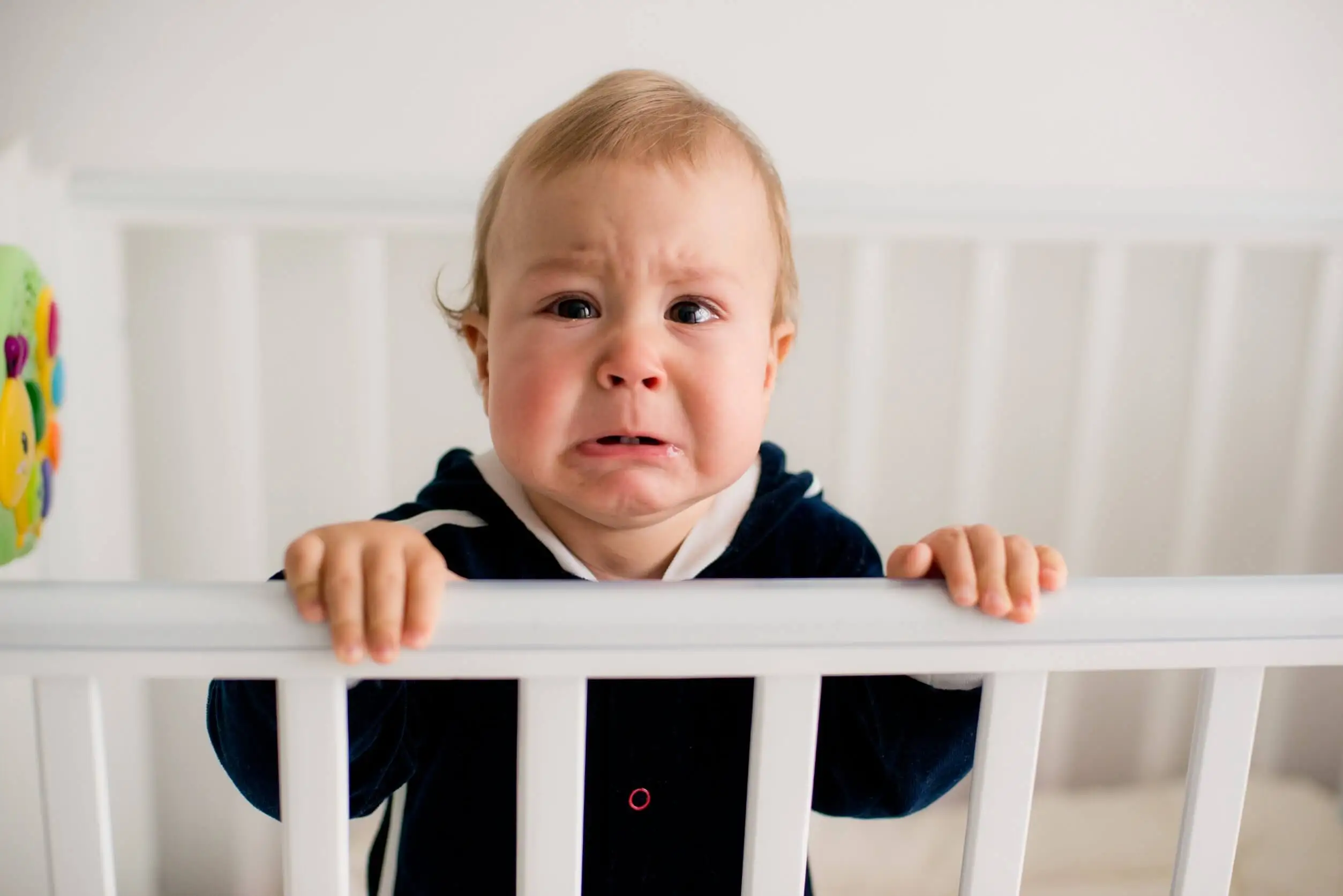What Is Eighth-Month Distress?


Reviewed and approved by the psychologist Elena Sanz
Eighth-month distress is a stage of infant development that’s characterized by a change in the infant’s social-emotional behavior. He or she wants to be in his or her mother’s arms all the time and is anxious when in the presence of strangers.
At this stage, the baby realizes that he and his mother are two different people. He or she also identifies the contrast between familiar and unfamiliar people. Eighth-month distress is a response to this emerging autonomy and awareness.
Although this stage is referred to as “eighth-month distress,” it can actually occur earlier or later. It usually occurs between 6 and 10 months, and is a time when the baby needs reassurance, love, and security. Let’s tale a look at what it’s all about.
Eighth-month distress: What is it?

Eighth-month distress is a normal developmental stage when the baby begins to understand the concept of self and stranger. That basic awareness leads him or her to feel anxiety when away from his or her mother or caregiver, and when confronted with people he or she doesn’t know.
Although it may not seem like it at first, this is a breakthrough. It means that he or she has begun to make accurate discrimination between himself or herself and the external world. While it’s true that this causes distress to the little one, it’s certainly a sign that the baby is evolving in terms of perception and awareness.
Also, the eighth-month distress is evidence that the baby’s memory is more developed. It remembers better the people it sees frequently and distinguishes them from those with whom it has had no contact.
The baby’s reactions may seem strange to the parents, but it’s very important to keep in mind that attachment to the mother and fear of strangers is not a setback, nor is it a whim. This is all part of normal child development and is a temporary phase.
Like this article? We think you may also like to read: Types of Attachment in a Relationship
How it manifests itself
It’s not possible to know exactly what’s going on in the baby’s head at this time. The little one realizes that he or she is very dependent on his or her mother and that, at the same time, she is an independent person. From this, the fear of her abandoning arises.
The mother becomes fundamental in her contact preferences. It’s usual that the baby starts to behave more distant from other relatives, such as grandparents or aunts and uncles. Also, it’s very common for the baby to feel anything from apprehension to terror toward strangers.
These are the most obvious manifestations of eighth-month distress: a more intense attachment to the mother and fear of people he or she does not see often or of strangers. This translates into behaviors such as the following:
- He or she follows his or her mother with his eyes, wherever she is.
- He or she feels uneasy when the mother disappears from his or her sight and even cries.
- Wants to be held in their mother’s arms all the time.
- In general, there’s more sensitivity and crying is more frequent.
- They are shy with strangers. They lower their gaze or cover their face with their hands.
- Sometimes, there’s even an absolute rejection towards strangers. They scream and cry when strangers approach them.
- They reject being held by people other than the mother.
- They wake up more often at night to make sure mom is near.
Why it happens

At the beginning of life, the baby cries for someone to attend to his or her needs, particularly for food and comfort or well-being. In reality, it doesn’t really care who does it. The only thing that counts for the little one is to feel satisfied.
You might also be interested in: Can Crying During Pregnancy Affect Your Baby?
Between 6 and 10 months, the baby becomes aware that he or she can’t take care of his or her needs on his or her own. In other words, that he depends on another person, usually the mother, to survive. This leads him to build a very close bond with the person who provides him with what he or she needs.
Before, he or she felt as if he or she and his or her mother were one and the same person. The baby was kept safe at all times and, because of this, he or she did not mind other people carrying them or approaching them. Now, he or she knows that his or her mother is one person and he is another. The fear of being abandoned leads to eighth-month distress.
Not being with his or her mother, even for a short time, makes the baby feel helpless. Therefore, he or she reacts with anxiety to separation. Eighth-month distress is considered the first form of distress, strictly speaking, that a human being experiences.
How to deal with eighth-month distress
It’s clear that eighth-month distress can be very overwhelming for the mother. She feels demanded by her baby all the time and may experience this with emotional tension and fatigue. The most important thing to understand is that this is a temporary situation and is part of the baby’s normal development.
The baby needs support and affection at this stage. If it’s not easy for the mother, it’s not easy for the baby. He or she is not becoming “spoiled”, nor does he or she want to manipulate adults. The baby just feels a very deep anxiety and expresses it through extreme attachment and rejection by people he or she doesn’t know.
The following are some tips for coping with this stage:
- Teach them by playing. The games of “hide and seek” are very appropriate. For example, covering their face and then uncovering it.
- Keep talking. If the mother leaves the room, it’s best to keep talking. Through her voice, the baby will understand that she’s still there.
- Use transitional objects. A blanket or a toy often becomes a kind of substitute that calms the child when the mother is not there.
- The baby will not understand everything, but it’s important to explain to him or her that mom is going out and then she will come back. Also, say goodbye to them and do not sneak out.
- Have a goodbye and arrival ritual. A brief farewell and arrival ritual will help the baby understand the dynamics of going out and coming back.
- Do not force the baby to accept other people. The baby is not becoming unsociable, nor does it matter how friendly or the loving strangers may be. If he or she doesn’t want to be in the arms of those people, don’t push them.
Keep calm at this stage
When the baby goes through the eighth-month distress, he or she is more sensitive than usual and also more irritable. The best thing to do is for parents to remain calm instead of getting caught up in the baby’s anxiety. A calm environment helps a lot.
It’s important to reiterate that this stage lasts only two or three months. Therefore, it’s just a matter of having some patience and accompanying the baby with love in this difficult process for him. In a short time, he or she will have managed to overcome the anguish of the eighth month, and everything will be fine.
All cited sources were thoroughly reviewed by our team to ensure their quality, reliability, currency, and validity. The bibliography of this article was considered reliable and of academic or scientific accuracy.
- Hernández Blasi, C., & Bjorklund, D. F. (2001). El desarrollo de la memoria: avances significativos y nuevos desafíos. Infancia y aprendizaje.
- Rev Pediatr Aten Primaria vol.11 no.43 Madrid jul./sep. 2009
- García-Fernández, P. (2003). Ante las Separaciones, ¿Sólo el Bebé se Angustia? Una Investigación sobre la Angustia Materna ante la Separación. El Difícil Arte de Editar (Editorial) 2 The Difficult Art of Editing, 11(1), 20-29.
This text is provided for informational purposes only and does not replace consultation with a professional. If in doubt, consult your specialist.








